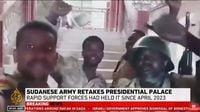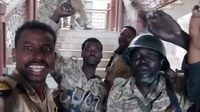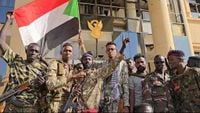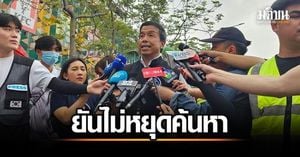On March 21, 2025, Sudan’s army announced it has successfully recaptured the presidential palace in Khartoum from the Rapid Support Forces (RSF), marking a significant victory in an ongoing civil war that has devastated the nation. Khaled al-Aiser, Sudan’s information minister, expressed the moment's significance, stating, “Today the flag is raised, the palace is back and the journey continues until victory is complete.” The capture of this strategic location is also seen as a symbol of national sovereignty and resilience following nearly two years of fierce conflict.
The RSF initially seized the palace in April 2023, soon after civil war erupted between the Sudanese Armed Forces and the paramilitary group. This struggle has produced what has been categorized as one of the world’s worst humanitarian crises, according to the United Nations. With nearly 15,000 deaths and over eight million people displaced, the implications of this conflict continue to unfold across Sudan.
Army spokesperson Nabil Abdallah elaborated on the military's operations, declaring that the army had engaged effectively, stating, “Our forces completely destroyed the enemy's fighters and equipment, and seized large quantities of equipment and weapons.” Video footage circulating on social media showcased jubilant soldiers inside the palace grounds, celebrating their hard-fought victory.
While the recapture of the palace is a significant military achievement, it also underscores the ongoing challenges the Sudanese Armed Forces face. RSF control of much of the capital region, coupled with its consolidation in the western Darfur region, complicates the security landscape. The RSF has signalled its intent to continue its operations, with commander Mohamed Hamdan Dagalo vowing in a recent address to defend the territories under RSF control and challenge the army’s gains.
In recent weeks, clashes have intensified, particularly around key locations, including the presidential palace. Bombings and drone strikes have characterized the fighting, as military advancements have prompted retaliatory actions from the RSF. Just hours after the palace’s retaking, an attack from an RSF drone resulted in the tragic deaths of three journalists, highlighting the significant risks faced by those reporting from conflict zones.
In understanding the broader implications of this military recapture, it is essential to consider the historical context. The conflict erupted from a power struggle involving General Abdel Fattah al-Burhan and Dagalo, initiated following a military coup in 2021 that derailed a fragile move towards democracy. Since then, the war between these factions has escalated, with both sides accused of egregious human rights violations and committed atrocities.
Notably, the RSF was accused by the United States of committing genocide against non-Arab groups in the Darfur region, which has further complicated peace efforts. The fear of escalating violence is palpable as the RSF works to establish a parallel government structure in the territories it controls—a move that could threaten Sudan’s sovereignty and lead to further entrenchment of division akin to what occurred in Libya amidst its civil unrest.
The humanitarian situation continues to deteriorate: the UN reports that over 12 million Sudanese are currently facing acute food insecurity, with many families resorting to desperate measures to survive. Amidst the chaos, humanitarian organizations struggle to provide aid as access becomes increasingly limited due to ongoing violence and territorial disputes.
Amid continued clashes and uncertainty, the RSF remains firm in its resolve; they claim to have seized control of strategic cities and are not expected to relinquish power without further conflict. The UN along with multiple international observers are closely monitoring the evolving situation, aware of the implications this conflict holds not only for Sudan, but for regional stability.
As the Sudanese army celebrates its reclaiming of the presidential palace, the future remains uncertain. It’s evident that although the battle for the palace has concluded, the broader war is far from over. The realities for millions living within the boundaries of this war continue to unfold, as both sides remain locked in a deadly struggle for power and control over Sudan’s future.









